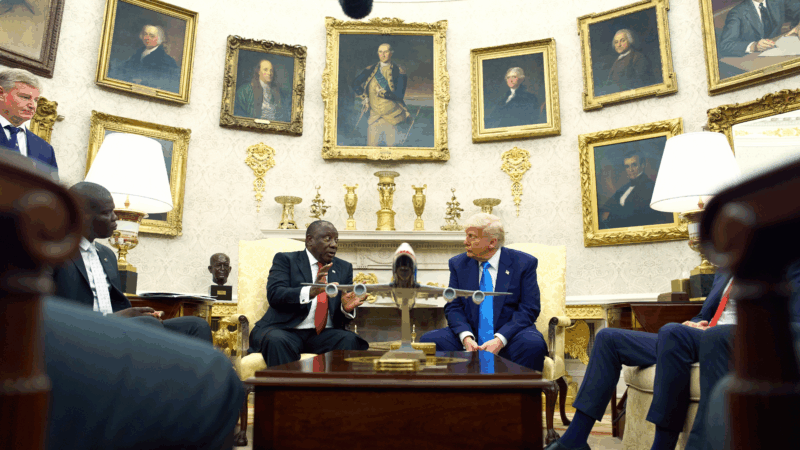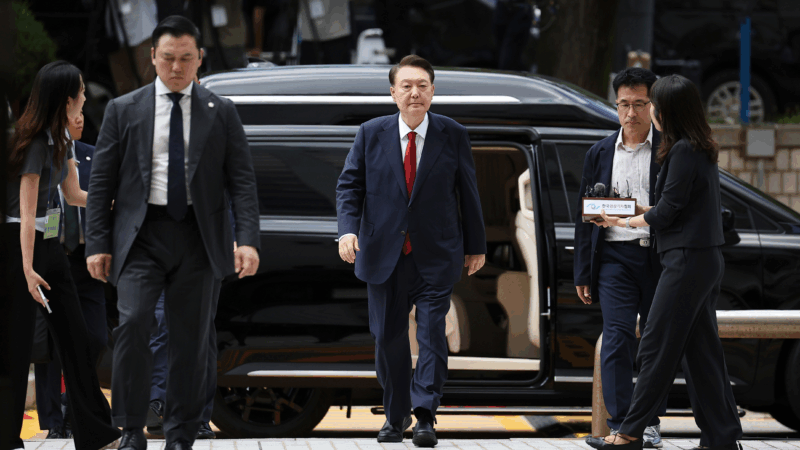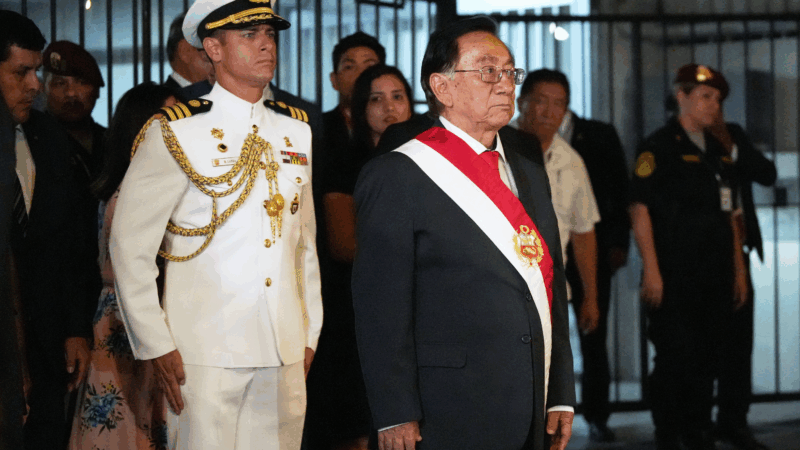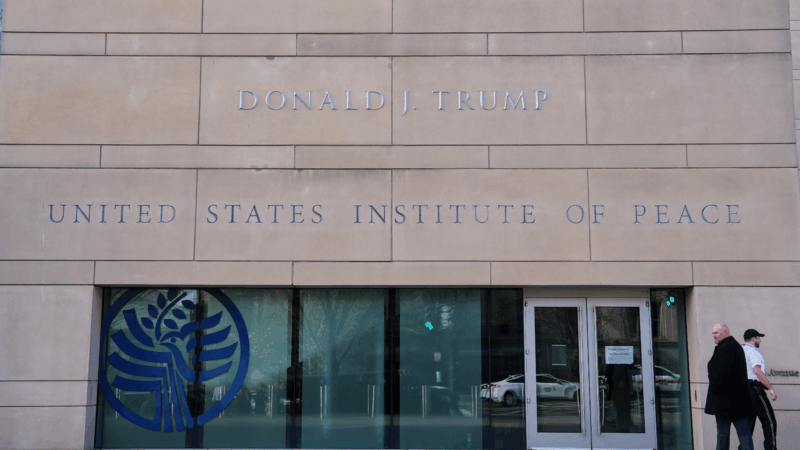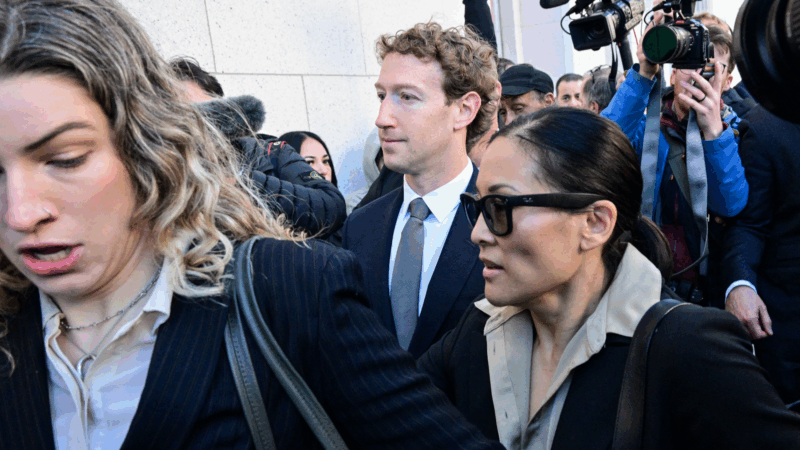South Africa’s president praised for staying calm during Trump’s Oval Office ambush
JOHANNESBURG — “All in all it was awful but it could have been worse,” was how one South African newspaper summed up President Cyril Ramaphosa’s extraordinary Oval Office meeting with President Trump on Wednesday.
Many South Africans – including those in the government delegation – had feared a repeat of February’s heated exchange between Trump and and Ukraine’s President Volodymyr Zelenskyy.
But despite what another newspaper called “serious provocation” by Trump – which included the dramatic moment he asked for the lights to be dimmed and played a lengthy montage of video footage purporting to prove “white genocide” – Ramaphosa kept his cool.
The South African leader, who was a protégé of Nelson Mandela, has experience intense negotiations. He was one of the key mediators in the talks that ended South Africa’s apartheid in 1994.
Most South African media as well as many social media users are praising him for remaining calm and polite throughout what’s widely being called the ambush by Trump, though some wished he’d hit back harder.
“Who among us did not also secretly yearn to see Ramaphosa fight back a little more?” asked writer Rebecca Davis in the Daily Maverick newspaper.
Ramaphosa himself tried to put a positive spin on things at a press briefing later on Wednesday. He said behind closed doors, at the lunch that followed the Oval Office drama, things had gone well. Trump might still attend the G20 in Johannesburg later this year, he said, adding they had also had good trade talks.
“I know that many South Africans were filled with concern and fear that we will have a ‘Z’ moment,” the president said, apparently referring to Zelenskyy, “and all that did not ensue.”
He added that he was sorry to disappoint the South African press corps who had travelled to Washington and wanted to see some drama, prompting one reporter to say: “Mr. President … I don’t know what constitutes drama in your book, but that was very dramatic.” Another reporter told Ramaphosa he deserved a stiff drink.
Debunking Disinformation
Despite the South African delegation’s attempts to explain the facts to the U.S. leader, Trump again and again repeated a right-wing conspiracy theory that there is systematic persecution and “genocide” of white South Africans. And used disinformation to support his allegations.
He misrepresented a video showing a protest, where people placed white crosses in a field to commemorate a farmer and his wife who were murdered in a 2020 home robbery, as a “burial site.” South African news site News24 said there are no bodies at the site and the number of crosses do not relate to the number of murders.
Trump also played clips of two controversial South African opposition politicians – who in no way speak for the government – singing songs from the struggle against apartheid, including one called “kill the Boer” – which means Afrikaaner or farmer.
The one politician, firebrand Julius Malema, heads a flailing opposition party that won just over 9% of the vote at the last elections. Trump asked why he wasn’t arrested. In fact Malema was taken to court on charges of hate speech for singing the song at rallies, and the Constitutional court ruled the singing of the song was protected by freedom of speech.
Malema seems to have delighted in his 15-minutes of Oval Office fame, posting dismissively on X: “A group of older men gathered in Washington to gossip about me.”
Finally, Trump handed Ramaphosa a bunch of printed articles that he said showed “death, death, horrible death.” News outlets in South Africa, as well as the AFP news agency, studied the articles and found some were from partisan blogs and unsubstantiated online sources.
One article Trump held up, saying it was about “white farmers being burned” was in fact about the Democratic Republic of Congo.

About those golfers
Whatever one’s take on the meeting, it’s undeniable it’s been dominating much of social media. White South African rightwing groups – and MAGA commentators – applauded Trump for repeating their talking points on race relations, while some far-left groups denounced Ramaphosa for bringing white South African businessmen and white star golfers along to the meeting.
Ramaphosa and Trump are both avid golfers, and the presence of former World Number 1 Ernie Els and two-time U.S. Open champion Retief Goosen was a tactic the South African team hoped would diffuse any tensions at the meeting. Els is a personal friend of Trump’s and is reported to have helped Ramaphosa get the White House meeting.
Also present was South Africa’s richest man, business mogul Johann Rupert, also white and Afrikaans and a friend of both presidents.
Rupert won some praise from South African media for telling Trump “it’s not only white farmers” who are victims of violent crime “it’s across the board,” and stating that non-whites were in fact the biggest victims. Ramaphosa’s white Minister of Agriculture John Steenhuisen, also challenged Trump, telling him most white farmers wanted to remain in South Africa.
But the golfers angered many.
Els seemed to support Trump’s narrative of white persecution, referring to the apartheid era but adding: “I don’t think two wrongs makes a right.” He also thanked the U.S. for supporting South Africa during its war with Angola – but as X users were quick to point out, that support had been for the old apartheid regime. “Ernie Els is worse than an apartheid apologist,” one X user wrote.
A Daily Maverick journalist wrote that the men were talented golfers but “what the hell do they have to do with international relations?” South African media asked Ramaphosa after the meeting if the golfers should not have been better prepped. He defended them as patriots, but admitted they could have been.
What is particularly galling to many though, is Trump’s derisive treatment of the head of state of a constitutional democracy. Several local newspaper articles pointed out he doesn’t treat authoritarian leaders with dubious human rights records like he treated the South African president.
Iran and the U.S. lean into gunboat diplomacy as nuclear talks hang in balance
Iran and the United States leaned into gunboat diplomacy Thursday, with Tehran holding drills with Russia and the Americans bringing another aircraft carrier closer to the Mideast.
Former South Korean President Yoon receives life sentence for imposing martial law
Former President Yoon Suk Yeol was sentenced to life in prison for his brief imposition of martial law in December 2024.
José María Balcázar becomes Peru’s eighth president in a decade
José María Balcázar has become Peru's new interim president, replacing another interim leader who was removed over corruption allegations just four months into his term.
Trump gathers members of Board of Peace for first meeting, with some U.S. allies wary
President Donald Trump will gather Thursday with representatives from more than two dozen countries that have joined his Board of Peace, for a meeting that will focus on the reconstruction of Gaza.
With a win over Sweden, the U.S. men’s hockey team will play for an Olympic medal
A thrilling overtime goal by defenseman Quinn Hughes puts Team USA through to a semifinal game against Slovakia. On the other side of the bracket, Canada had its own close call, but moves on to face Finland.
Zuckerberg grilled about Meta’s strategy to target ‘teens’ and ‘tweens’
The billionaire tech mogul's testimony was part of a landmark social media addiction trial in Los Angeles. The jury's verdict in the case could shape how some 1,600 other pending cases from families and school districts are resolved.

